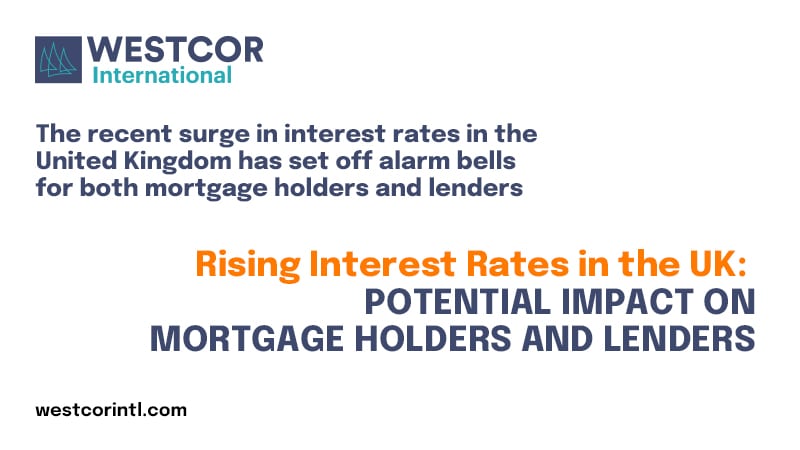Rising Interest Rates in the UK: Potential Impact on Mortgage Holders and Lenders

Image: Josh Dennis, Senior Underwriter and Head of Schemes and Christopher Taylor, Corporate Development Director
The recent surge in interest rates in the United Kingdom has set off alarm bells for both mortgage holders and lenders. As the Bank of England takes measures to control inflation, the burden of rising mortgage costs is hitting homeowners hard and threatening the very fabric of the market.
With 40% of borrowers struggling to meet their payments, there is undoubtedly cause for great concern.
Here we’ll provide a comprehensive analysis of the unfolding mortgage crisis.
The rising risk of mortgage defaults
As lenders withdraw or reprice their mortgage deals in response to higher-than-expected inflation, many homeowners will be concerned about their fate when the initial term of their mortgage product expires.
Unless the incumbent lender is willing to offer new terms, borrowers may struggle to secure financing elsewhere. For instance, a homeowner paying a fixed interest rate of 1.8% for five years could face quite a shock should their rate jump to 7% at the end of the term. Even considering interest payments alone, this represents a staggering 380% increase or a 3.88 multiple on the interest rate.
Moreover, borrowers may find it challenging to secure new loans, as lenders have tightened their underwriting requirements, bringing in strict affordability checks. This leaves them at the mercy of two things: being restricted to their current lender’s retention terms, which will likely still end in a significant jump in interest or, worse, becoming trapped with a standard variable rate if they cannot access more competitive products in the open market.
Of course, the impact of rising interest rates is not limited solely to homeowners; commercial borrowers are also at risk. For instance, if a commercial developer opts for a short-term lending solution, such as a one-year development loan, they may need to refinance it. If the borrower fails to find an alternative mortgage and the lender is unwilling to extend the loan, default becomes a likely outcome.
In such cases, the lender may instruct their lawyers to seek possession of the property or engage a LPA receiver to recover the money on their behalf, which is a dire situation for all parties involved.
The landscape for buy-to-let landlords that own their properties personally is even more stark thanks to the changes made to taxation by the Cameron and Osborne government. The scrapping of tax relief on mortgage payments for these borrowers had already forced many owners to sell their investment properties but others hung in there whilst interest rates remained low. Now that interest rates have surged, there are many landlords left holding properties, where the tax burden significantly exceeds the profit made, with tax being charged at the owners’ highest rate on the gross rent received.
The rates offered by buy-to-let lenders are higher than those offered to home buyers, so the expectation is that the market will be flooded with investment properties being put up for sale and this will be followed, almost certainly with a reduction in asking prices.
Landlords have only a limited ability to increase rents, so if they cannot make the maths work and they cannot sell their properties quickly the mortgage defaults must surely follow.
A foreboding echo from the past
The circumstances within today’s market are reminiscent of the market I joined in 1991. The mortgage market, after all, heavily relies on the validity of property titles certified by the solicitors they instruct, and any mistakes in documentation or undiscovered title defects can cause significant problems when loan defaults occur.
These problems often remain hidden as borrowers refinance from one lender to another, concealing any underlying issues. However, as we saw in 1991 and again in 2008, when the forbearance period ends and the merry-go-round stops, title issues emerge, along with conveyancing errors threatening the very security that those lenders had expected to rely on.
Having served the mortgage market as a title insurer for the last 23 years and the wider market for over 30 years, trust me when I say, I have seen the claims and wear the scars from those periods.
If loan documents were poorly executed, for example, it is the last lender of record left holding the problem, and they may struggle to enforce their security if an inexperienced firm has failed to follow their instructions. We are in an environment where it is highly likely, once again, that the proverbial ride will come to a halt, heightening the risk of unknown problems bubbling to the surface.
Westcor: A helping hand
Drawing from past lessons, lenders must do all they can to protect their interests and leaning on title insurance can go a long way to assist. Our Perfect Title policy, provides an unequivocal guarantee that a mortgage lenders loan is valid, enforceable, secured against a good and marketable title and that the loan has the priority expected. Any challenge to this is picked up by the policy and if the problem cannot be cured within 6 months, with all legal expenses being met under the terms of the contract of insurance, the outstanding principal balance will be settled along with any accrued unpaid interest.
Designed to mitigate the risks associated with secured lending, the Perfect Title policy protects against transactional defects such as fraud, forgery, negligence, undue influence, mental capacity and planning issues whilst, also protecting the lender against any latent title defects, such as defective leases, covenant issues, undocumented rights, ownership and much more.
While we cannot control the macroeconomic factors contributing to rising interest rates, we can help to ease lenders’ worries swiftly and diligently, by providing a true risk assignment tool, protecting the balance sheets of mortgage funders whilst, also protecting them against the inevitable legal expenses caused by trying to restore stability to their loan portfolios in as little as six months, thanks to our flexible approach to underwriting and the guarantee the policy provides.
To learn more about our title insurance products, contact us today.





